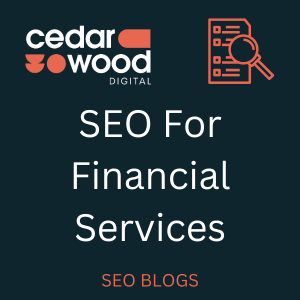Introduction
Search engines are now a dominant force in the decision-making process for financial consumers. Whether it’s a consumer choosing a mortgage broker, a retiree researching pension options, or a startup searching for a business loan, nearly all journeys begin with a Google search. According to Google’s own data, over 70% of consumers use search during their decision-making journey in the financial sector.
But for financial services brands, ranking highly isn’t just about technical optimization or keyword stuffing. You’re operating in a “Your Money or Your Life” (YMYL) space, one of Google’s most scrutinized verticals and that means your SEO efforts must do more than attract clicks, they need to inspire trust, meet compliance standards, and deliver genuinely helpful content.
This comprehensive guide explores how to build a compliant, high-performing SEO strategy tailored for the financial services sector in 2025.
Why SEO Matters in Financial Services
Let’s be clear: SEO is not a “nice to have” in this sector – given the strong YMYL guidance across finance, adhering to guidelines and following these processes plays an important role in ensuring visibility for your brand while also meeting regulatory compliance.
1. Search Is the First Step for Most Customers
Whether it’s “best life insurance UK” or “can I get a mortgage as a contractor,” the first action people take is searching online. If your brand isn’t visible at that moment, you’ve lost the sale often before you knew the prospect existed.
2. Organic Leads Have High ROI
While paid search can deliver leads quickly, SEO compounds over time and delivers leads at a lower cost per acquisition (CPA). In industries like wealth management or insurance, where the customer lifetime value is high, organic leads can be the most profitable over time.
Additionally, paid search traffic in these sectors can often have an incredibly high cost per click, so being able to attract leads organically plays a key role in being able to keep costs down and within control compared to spiralling PPC costs.
3. Trust Is Earned Through Visibility
Ranking high in Google suggests credibility. In a space where trust is everything, consistent organic visibility reinforces that your brand is authoritative, secure, and worth engaging with.
4. Google Prioritises Accuracy in Finance
Because misinformation can have serious consequences in this industry, Google’s algorithms and human quality raters apply stricter standards to financial content. Your SEO efforts must account for these guidelines, or risk invisibility.
Challenges of SEO in Financial Services
The financial industry brings some unique hurdles that marketers in fashion or e-commerce simply don’t face.
A. E-E-A-T Requirements
Google’s emphasis on Experience, Expertise, Authority, and Trust (E-E-A-T) hits hardest in sectors like finance. If your content lacks expert attribution, verified information, or real-world credibility, it will struggle to rank no matter how well optimized it is. This is often due to the fact that E-E-A-T isn’t just an acronym in these sectors, it’s a way for Google to see that your website is offering genuine value to a user and not putting them in any potential danger.
B. Compliance and Legal Oversight
Financial services content must comply with regulations from bodies like the FCA (in the UK), the SEC (in the US), or other international watchdogs. This creates friction when publishing blog posts, on-page copy, or campaign landing pages. Legal reviews can delay content for weeks, or require fundamental rewrites so it’s important to have a clear understanding of how compliance ties into SEO to make this process as smooth as possible.
C. Longer Content Production Cycles
Because of compliance and internal sign-off requirements, financial brands often have slower, more complex editorial workflows. This makes agility (such as responding to search trends or news) harder which can hinder link-building and content freshness. Experienced SEO agencies in this sector will know what works best from a links perspective and be able to apply this approach to support your business.
D. Difficult Link Building Environment
Google considers backlinks as a signal of authority, but in finance, acquiring these links ethically can be difficult. Many sites are reluctant to link to financial services due to regulatory fears, or they demand high editorial standards, alternately even just getting content in for reactive newsjacking can have a long sign-off process meaning that you can miss the hook. Effective link building in this sector can be a game changer when it comes to performance due to the trickier nature of it.
Core SEO Strategies That Work for Financial Services
Despite the challenges, many financial brands are winning in organic search by focusing on the right strategies.
1. Building E-E-A-T Into Every Page
To rank well in YMYL categories, your website and content must scream trust and authority.
Ways to Strengthen E-E-A-T:
- Showcase Authors and Credentials: Every blog post or guide should be written or reviewed by someone with clear financial expertise and their credentials should be visible.
- Third-Party Validation: Include awards, media mentions, and Trustpilot reviews to support your credibility.
- Secure and Transparent Website: Use HTTPS, display your regulatory information (e.g. FCA license number), and include a clear privacy policy and terms.
- Create a Transparent “About Us” Page: This should explain your company’s mission, leadership team, and experience.
Real-World Example:
NerdWallet includes certified financial experts on all of their content and states when it was last reviewed. This type of content hygiene helps Google trust their information and it’s why they rank well for thousands of high-intent financial terms.
2. Keyword Strategy Based on Intent, Not Just Volume
Most financial brands fall into the trap of chasing broad, competitive keywords like “life insurance” or “pension advice.”
Instead, focus on user intent — and break it into three stages:
Awareness Stage:
- “What is income protection insurance?”
- “How does compound interest work?”
Consideration Stage:
- “Best savings accounts for under 30s”
- “Credit card vs overdraft: which is cheaper?”
Decision Stage:
- “Apply for a fixed-rate mortgage online”
- “Open a stocks and shares ISA with no fees”
Tip: Use tools like AnswerThePublic, AlsoAsked, and Google Search Console to discover long-tail and question-based keywords you can realistically rank for.
3. Content Hubs and Topic Clusters
Rather than publishing one-off blogs, build structured content clusters that build topical authority.
Example Cluster: “First-Time Buyers”
- Main Pillar: “Complete Guide to Mortgages for First-Time Buyers”
- Supporting Blogs:
- “5 Government Schemes for First-Time Buyers in the UK”
- “What Credit Score Do You Need for a Mortgage?”
- “How Much Deposit Do You Really Need?”
Internal linking between these articles tells Google your site is a trusted authority on that topic, improving rankings across the board. You can also then tailor an effective Digital PR strategy to help build deeper links into these pages, building authority and supporting the overall performance of the cluster.
4. Local SEO: A Missed Opportunity for Many
If you offer in-person services even if it’s hybrid or Zoom-based local SEO can help you reach qualified leads.
Must-Have Elements:
- Location Pages: e.g. “Independent Financial Advisor in Bristol”
- Google Business Profile Optimization: Use categories, respond to reviews, add Q&As, post regularly.
- Local Backlinks: Consider local events, get listed in business directories, build partnerships with community organisations.
5. Technical SEO: The Foundation You Can’t Ignore
Financial websites tend to be large and complex with multiple product pages, calculators, forms, and FAQs. Technical SEO ensures all of this is crawlable, indexable, and performant.
Key Areas to Address:
- Core Web Vitals: Ensure fast loading, visual stability, and interactivity
- Mobile Optimization: Most users now research on mobile, your site must be flawless here
- Schema Markup: Use FinancialProduct, FAQPage, and Organization schemas where relevant
- XML Sitemaps and Robots.txt: Keep these clean and updated
- Duplicate Content: Especially with rates and regulations, ensure content isn’t copied across pages
Digital PR and Ethical Link Building
Earning high-quality backlinks is critical in building authority but you must avoid spammy or black-hat tactics, especially in finance.
Link-Building Strategies That Work:
- Data-Led PR Campaigns: Commission or analyse data and pitch stories to journalists (e.g. “Average UK Credit Score by Age Group”)
- Expert Commentary: Offer your advisors as expert spokespeople to react to breaking news
- Create Free Tools: Mortgage calculators, ISA allowance trackers, or pension age checkers often earn links
- Publish Original Research or Whitepapers: Journalists and bloggers love citing original data
Example:
Comparison websites have successfully gained thousands of high-authority links by creating utility comparison tools, consumer affordability studies, and reacting quickly to news stories with expert advice.
Measuring SEO Success in Financial Services
Your SEO reporting should tie back to business outcomes not just traffic.
Key Metrics to Track:
- Organic Visibility: Impressions, ranking positions, and share of voice
- Engagement Metrics: Time on page, scroll depth, bounce rate
- Lead Metrics: Form submissions, quote requests, downloads
- Conversion Attribution: Use GA4 and CRM integrations to connect content to customer actions
- E-E-A-T Signals: Number of referring domains, quality of backlinks, author profiles built
Tip: Combine data from Google Search Console, GA4, Semrush, and your internal CRM for a full-funnel picture.
Emerging Trends to Watch in 2025
- AI Overviews in Search Results: Google’s AI-generated summaries mean more zero-click searches, so optimise content for inclusion in these overviews
- Voice and Conversational Search: More people are searching with natural, question-based queries
- Search Personalisation: Rankings now vary more by user location, history, and intent local SEO and behavioural data matter more than ever
- Topical Authority > Page Authority: Building deep, useful content around a theme will outperform isolated “SEO blog posts”
Conclusion
SEO for financial services in 2025 is about trust, authority, and helpfulness. You’re not just competing for clicks you’re competing to be the most credible option in a high-stakes decision. That means building a search strategy that balances compliance with creativity, data with empathy, and technical structure with user experience.

